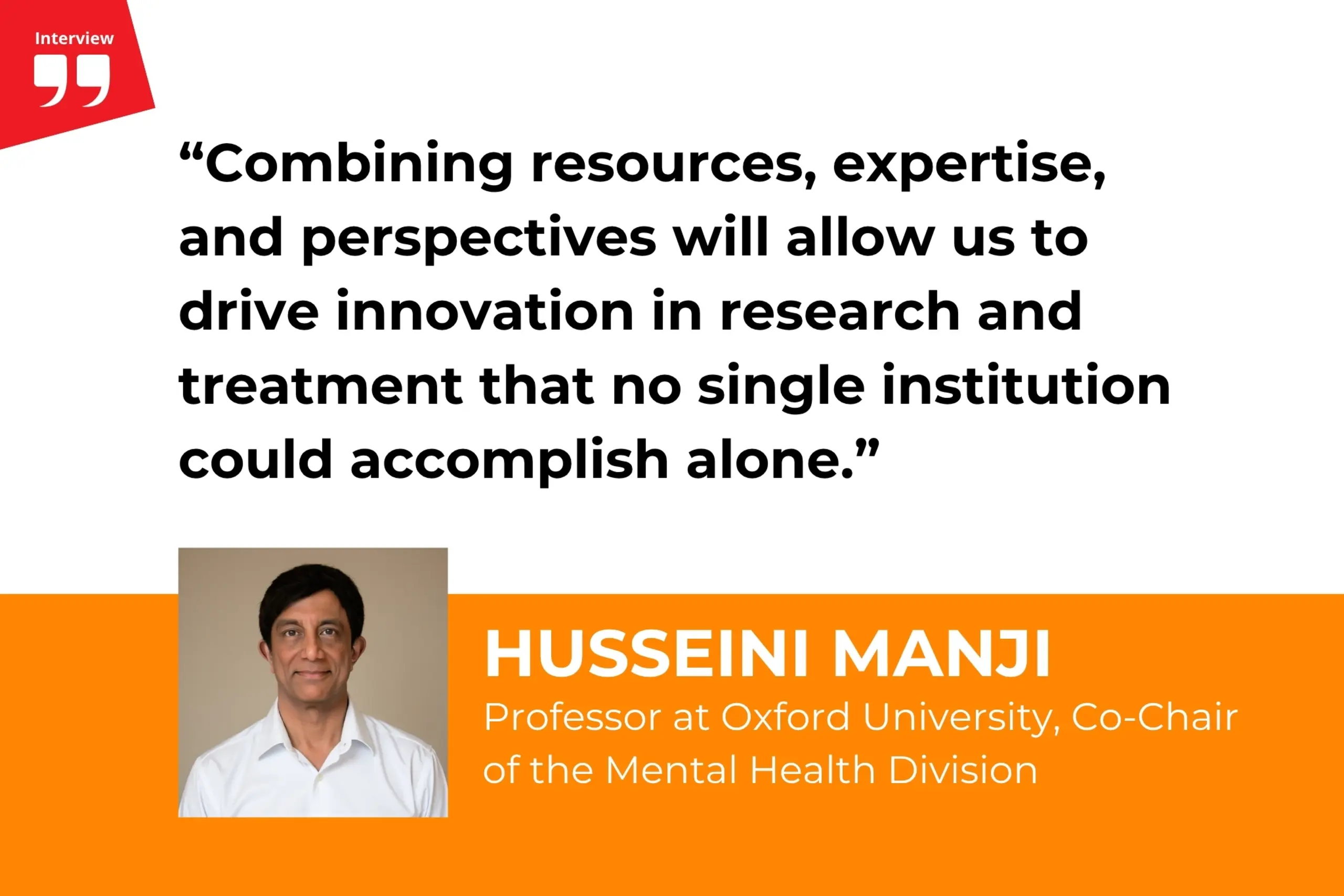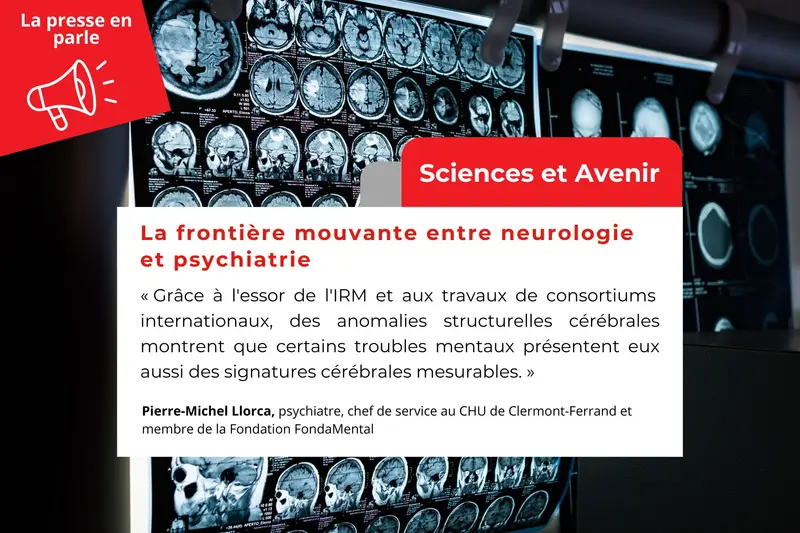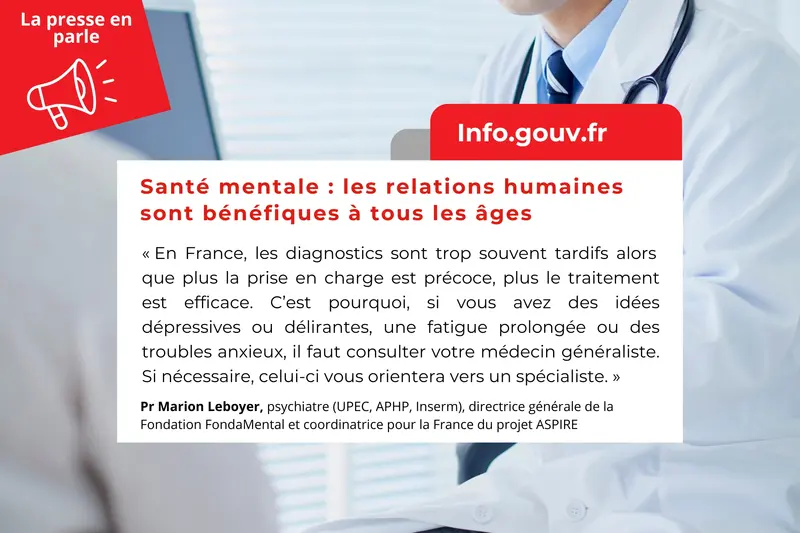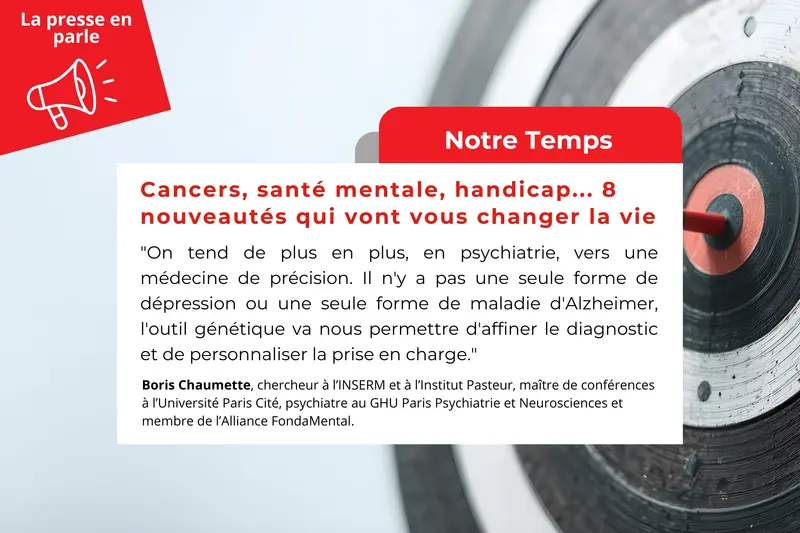
Advancing Precision Psychiatry: The UK-France Consortium's Path to Personalized Mental Health Treatment
Husseini Manji
Professor at Oxford University, Co-Chair of the Mental Health Division
Could you provide an overview of the consortium project between France and the UK, and its role in advancing precision psychiatry research?
Mental illness is a significant global challenge, impacting health, economic prosperity, and social well-being. It often begins in adolescence or early adulthood, which is why it is referred to as a «chronic disease of the young.» Mental health disorders present a global economic public health challenge. According to the WHO, mental disorders have been the leading cause of disability worldwide since 2020 (currently constitute five of the top ten causes of disability worldwide). In this context, more than 80 million EU citizens of all ages—up to 18% of the general population—will experience some form of mental health disorder in their lifetimes.
Treating mental illness is crucial, and while there is a clear need for better treatments, one of the challenges lies in the complexity of mental health disorders. Many large pharmaceutical companies have been hesitant to invest in mental health due to this complexity. First, the brain is not easily accessible for study; while we have advanced imaging techniques, we cannot perform biopsies as we can with other organs. Furthermore, mental illnesses often involve a combination of genetic and environmental factors, leading to diverse subtypes of patients. For example, major depressive disorder likely includes many subtypes of patients lumped together under one diagnosis. The current approach of treating all patients with the same treatment has proven inadequate, which is why precision medicine—tailoring treatments based on specific patient subtypes—holds great promise. This UK/France consortium aims to better understand these conditions and apply a precision medicine approach, similar to what has been done in oncology. By identifying biological markers for various subtypes, we can provide targeted treatments that will lead to better outcomes for patients.
The UK and France are both world leaders in mental health research. By collaborating and bringing together 53 interconnected centres with shared databases and biobanks in France and 14 centres in England, we believe we can achieve more than by working in isolation. Combining resources, expertise, and perspectives will allow us to drive innovation in research and treatment that no single institution could accomplish alone. Our goal is to integrate data, infrastructure, and funding to improve patient outcomes. Precision medicine, where treatments are tailored to an individual’s genetic and biological profile, requires cross-border collaboration. This approach has already proven successful in fields like oncology and Alzheimer’s disease, where we have linked biomarkers to clinical outcomes. We hope to achieve similar results in mental health by combining our efforts.
Why is the identification of biological biomarkers in psychiatry crucial, and how can this approach mirror the progress made in oncology or Alzheimer’s research?
To illustrate the power of precision medicine, I’ll use examples from oncology and Alzheimer’s disease. Oncology is farthest along in terms of precision medicine. Traditionally, cancers were classified based on symptoms or affected tissues—such as lung, breast, or colon cancer. However, researchers have now shifted their focus to the biology driving the cancer, leading to targeted treatments based on the specific biology of the cancer. This shift has transformed cancer treatment, allowing patients to live longer, healthier lives by receiving treatments that target the underlying biological causes of their cancer.
Similarly, in Alzheimer’s disease, we have learned that the disease begins years before symptoms appear. By identifying biomarkers early, we can intervene before dementia sets in. Through collaboration between various countries, pharmaceutical companies, and regulators, we have been able to identify biomarkers that predict the onset of dementia, leading to the development of treatments that slow disease progression. None of this would have been possible without collaboration. Our hope is that by applying similar strategies to mental health, we can identify biomarkers for mental illnesses and use them to develop more effective treatments.
In what ways can the division of major mood disorders and psychosis into homogeneous subgroups enhance clinical trials, and contribute to reducing the costs and risks associated with drug development?
Mental health disorders, such as major depressive disorder, are often diagnosed based on a list of symptoms. However, we believe that these broad categories are insufficient. Just as high blood pressure can have various causes, depression or psychosis can arise from different biological mechanisms. Some patients may have depression due to problems with hippocampal plasticity, while others may have it due to immune abnormalities. Understanding these subtypes is essential for effective treatment. If we treat all patients with depression in the same way, we risk providing ineffective treatments. However, if we target the specific biological cause of a patient’s depression—whether it’s immune-related or due to hippocampal dysfunction—we can achieve much better results. This precision approach not only improves outcomes but can also reduce the cost of clinical trials by focusing on a smaller, more specific group of patients.
Moreover, our diagnostic criteria for conditions like major depression rely on symptoms such as anhedonia (lack of pleasure). Research has shown that the biology underlying anhedonia is linked to reward circuitry in the brain, which can be influenced by immune factors. By identifying patients with prominent anhedonia and offering a complementary treatment specifically targeting the immune-related biology, we can improve their symptoms more effectively. This approach can also apply to other psychiatric disorders like bipolar disorder and schizophrenia, making treatments more precise and effective across multiple conditions.
How can long-term international collaborations, particularly between France and the UK, accelerate the identification and validation of biomarkers, while also facilitating broader accessibility to costly research tools?
The collaboration between the UK and France will bring together the expertise and resources of two world leaders in mental health research. This partnership will enable us to solve problems more quickly and share data more effectively. One of the key benefits of this collaboration is the potential for enhanced data sharing and open science. By working together, we can develop low-cost, accessible biomarkers and treatments that can benefit people everywhere, regardless of their location. Standardizing data collection methods—such as how blood, saliva, and digital samples are gathered—will ensure that treatments and markers are widely accessible.
In addition to improving research outcomes, this collaboration will provide valuable training opportunities for the next generation of researchers. By engaging regulators early in the process, we hope to ensure that the research we conduct translates into real-world applications. The goal is to make treatments available to all patients, with a focus on precision and accessibility.
How can improved mental health treatment strategies not only enhance patient outcomes but also address stigma and deliver broader societal benefits?
One of the biggest challenges in mental health is the stigma surrounding mental illness. Unlike physical conditions like diabetes, mental illness often carries a sense of shame, causing many individuals to avoid seeking treatment until it’s too late. This stigma can lead to social exclusion and missed opportunities for treatment, which only worsens the outcomes. However, as we develop better treatments and demonstrate their effectiveness, we can help reduce stigma. Just as advances in the treatment of HIV and cancer helped lessen stigma around those diseases, we believe that better treatments for mental illness will have a similar effect.
Furthermore, younger generations are more open about mental health issues than previous ones, and they can help change societal perceptions through social media and other platforms. By working with these generations, we can reduce stigma and increase awareness about the biological basis of mental illness. As we continue to improve treatments and provide more personalized care, we hope to create a society where mental illness is seen as a medical condition, not a source of shame.


